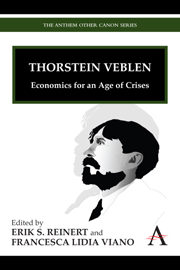Book contents
- Frontmatter
- Contents
- Acknowledgements
- List of Contributors
- 1 Introduction
- 2 Veblen's Contexts: Valdres, Norway and Europe; Filiations of Economics; and Economics for an Age of Crises
- Part One Norwegian Origins and Personal Life
- Part Two American Education
- 7 Ithaca Transfer: Veblen and the Historical Profession
- 8 Schooling for Heterodoxy: On the Foundations of Thorstein Veblen's Institutional Economics
- Part Three Veblen's Politics
- Part Four Veblen's Economics
- Name Index
- Subject Index
8 - Schooling for Heterodoxy: On the Foundations of Thorstein Veblen's Institutional Economics
from Part Two - American Education
Published online by Cambridge University Press: 05 May 2013
- Frontmatter
- Contents
- Acknowledgements
- List of Contributors
- 1 Introduction
- 2 Veblen's Contexts: Valdres, Norway and Europe; Filiations of Economics; and Economics for an Age of Crises
- Part One Norwegian Origins and Personal Life
- Part Two American Education
- 7 Ithaca Transfer: Veblen and the Historical Profession
- 8 Schooling for Heterodoxy: On the Foundations of Thorstein Veblen's Institutional Economics
- Part Three Veblen's Politics
- Part Four Veblen's Economics
- Name Index
- Subject Index
Summary
Attentive observer that he was of discoveries occurring at the frontiers of the biological sciences a century ago, Thorstein Veblen, were he transported to our own time, would almost certainly be fascinated by the research of contemporary biological scientists, perhaps especially by the work of those in the thriving field of comparative genomics. Findings by genomics researchers that, for example, human DNA and the DNA of chimpanzees differ by less than 1.2 per cent would have captivated Veblen, who – we may confidently assume – would have followed with great interest scientists’ current efforts to plumb this comparatively small zone of interspecies genetic difference and to specify the particular bundle of genes that differentiates humans from chimps (and others species), as well as to identify precisely when and how these distinguishing genes emerged in the course of human evolution. At the least, Veblen would have understood the reasoning of present-day evolutionary anthropologists, paleo-neurologists and other genomic scientists when they hold that finding the human genetic differentia furnishes one of the keys to our origins as humans.
- Type
- Chapter
- Information
- Thorstein VeblenEconomics for an Age of Crises, pp. 173 - 202Publisher: Anthem PressPrint publication year: 2012
- 2
- Cited by



